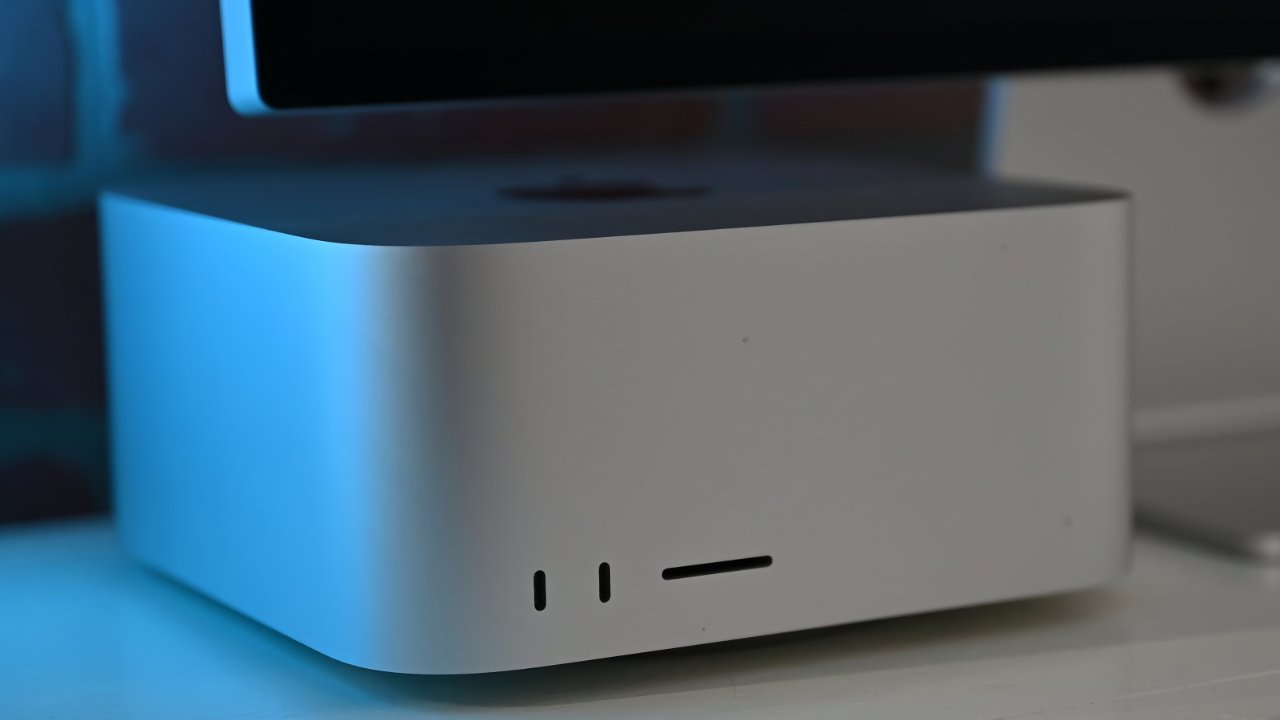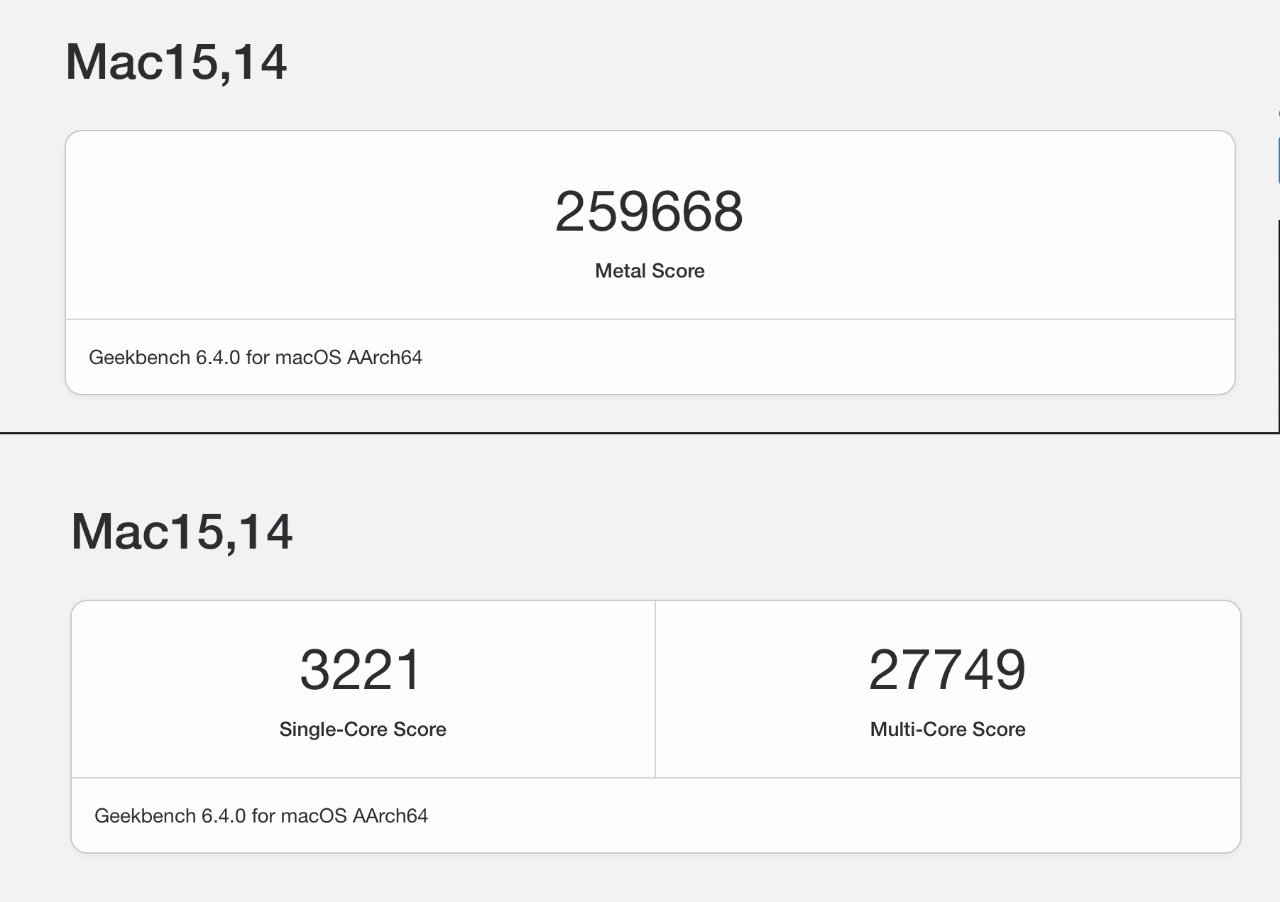Unsurprisingly, the performance of the new Mac Studio with M3 Ultra appears to be markedly faster than its predecessor, at least according to initial benchmarks.
Following the first benchmarks of the M4 Max in the new Mac Studio, initial figures are starting to appear for the M3 Ultra version. Compared to the previous Mac Studio's M2 Ultra, Geekbench shows improvements that will be significantly noticeable in the most demanding uses.
There will be more sets of figures for the Mac Studio's M3 Ultra once the machine is users' hands. However for now, the headline is that it is between 16% and 30% faster than its predecessor.
In November 2024, AppleInsider compared how Apple Silicon had improved since the M1. At that point, the then-current M2 Ultra Mac Studio scored 2777 single core and 21351 multi-core, in Geekbench testing.
By comparison, the first Geekbench figures for the M3 Ultra show a single-core score of 3221, which is approximately 16% faster. The M3 Ultra multi core score is 27749, or approximately 30% faster than the M2 Ultra.
In Metal GPU benchmarking, the M2 Ultra scored 221824, compared to the M3 Ultra's 259668. That makes the new machine faster by 17%.
Compared to the M4 Max
The Mac Studio is also available with an M4 Max processor, and benchmarks for that chip have been established in the 16-inch MacBook Pro. Once again, the M3 Ultra beats the M4 Max — but only in the multi-core test.
For that, the M3 Ultra's 27749 score is around 7.8% faster than the M4 Max, with its 25735. That's a decent improvement, even if it may not be noticed by most users.
We've seen this before on benchmarks with the M2 Ultra. There not being a huge separation in multi-core benchmarking is mostly an artifact of how the benchmarks work, as the real-world gains for the M2 Ultra were clear.
It's only with the single core that the M3 Ultra disappoints, though. For that, the M4 Max scores 3930 compared to the M3 Ultra's 3221 — meaning that the M4 Max is some 22% faster for nearly every "casual" computing job.
It does seen to prove, though, that most users not involved in deep computation will be better served with the less expensive M4 Max version of the Mac Studio.
Compared to the M3 Max
It's not a surprise that the M3 Ultra processor is faster than its predecessor. Nor is it a shock that what Apple says is the fastest Mac they've ever made should also beat the M3 Max processor in the MacBook Pro.
But the margin of victory is noteworthy. For the GPU, where the M3 Ultra's Metal score is 259668, the M3 Max MacBook Pro managed 155991.
That makes the new Mac Studio a fraction over 66% faster than the M3 Max MacBook Pro. This is the most significant difference, though, with other scores coming in closer.
For instance, the multi-core score for the M3 Ultra is 33.5% faster than that of the M3 Max. The scores are 27749 for the M3 Ultra, and 20785 for the M3 Max.
That's still appreciably faster, but users will need to be on very time-pressured work to notice the single core difference. In that case, the M3 Ultra scores 3221, but the M3 Max is on 2971 for a difference of just over 8%.
With only one example showing in the Geekbench listings so far, any figures have to be considered preliminary at best. But the earliest figures comparing the benchmarks of the M4 Pro versus the M2 Ultra proved to be broadly correct.
 William Gallagher
William Gallagher








-m.jpg)






 Christine McKee
Christine McKee
 Malcolm Owen
Malcolm Owen

 Charles Martin
Charles Martin


 Mike Wuerthele
Mike Wuerthele



-m.jpg)






21 Comments
Where does 2971 single-core score come from for the M3 Max? Geekbench.com indicates over 3100 for the various Mac platforms with M3 Max... and that's an average of a lot of results that includes some people who didn't run a careful benchmark. My own M3 Max results are over 3200.
As for multi-core, Geekbench.com reports ~20,900 average, while my careful test results were over 21,600.
So, only pay the M3 Ultra if you need a lot of GPU performance, or a lot more RAM than you can attach to an M4 Max (or for some reason need double the displays). The Ultra does so far seem to be most underwhelming part of the Apple Silicon family.
I've been a Mac user since the original 1984 model … but benchmarks in recent years confuse me, given the nature of multi-core machines these days, not to mention performance vs. efficiency cores, etc. Consider these two new Mac models:
I understand the idea that a lot of software basically gets its work done with the CPU and that only some software is written to get its work done with the GPU. I also understand the idea that each generation of processor does its work faster — thus, M4 processors will have higher single-core scores than comparable M3 processors.
But unless those M3 processors are far, far slower than M4 processors (which isn't the case — we're not talking M1 versus M4 here), wouldn't the model with the M3 Ultra outperform the model with the M4 Max every time because the M3 Ultra has twice as many cores? I thought, perhaps mistakenly, that macOS more or less hides the number of cores from software — that is, an app sends instructions to the CPU once, and macOS takes care of giving that work to all of the cores available to it on a given machine.
I have this image in my mind of horses pulling two wagon trains full of cargo (equal amounts in each train) across the plains. One wagon train has 14 horses, and they are younger and stronger. The other wagon train has 28 horses. They're a bit weaker and more tired … but even so, they're not that much weaker, and there are twice as many of them! Wouldn't the 28-horse team (the M3 Ultra) beat the 14-horse team (the M4 Max) every time? (I suppose it's not as simple as that.)
My use case: I do a lot of editing in Final Cut Pro, mostly HD but some 4K, and some of the projects are 30 minutes long. Is it worth it for me to buy a Mac Studio with M3 Ultra? Twice as many horses which aren't that much weaker…
A strange choice to release an M3 ultra instead of an M4 ultra at this point. But , no doubt reasons that make sense to Apple.